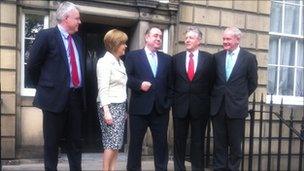No free lunch - the cost of cutting corporation tax
- Published
- comments

The summit was hosted by Scotland's First Minister Alex Salmond and his deputy Nicola Sturgeon. Peter Robinson, Martin McGuinness and First Minister of Wales Carwyn Jones also took part.
When Sir George Quigley initially proposed cutting local corporation tax to match the enticing rate south of the border, it sounded like a no brainer.
Not a big loss for the Treasury, but a giant step forwards for Invest Northern Ireland.
It was only over time that the realisation sank in that, under European rules on state aid to regions within nations, any cut in corporation tax would come with a price tag.
The exact amount will depend on how much any future Stormont administration decides to reduce the rate - but previous reports have estimated that, under the Azores ruling, the compensating cost to the NI block grant could be in the order of £215m per year.
Sitting in Alex Salmond's base at Bute House in Edinburgh yesterday, it was interesting to watch my Scottish journalistic counterparts suddenly getting to grips with the reality that cutting corporation tax would not be a free lunch.
Peter Robinson, extrapolating from the Northern Ireland estimate to an equivalent impact on Scotland's bigger budget, guessed the impact on the Edinburgh administration could be between £1bn and £1.5bn.
Attractive
Questioned about this, Alex Salmond played down the estimate, pointing out that any cut to the Scottish grant would depend on how far Scotland chose to reduce corporation tax.
Mr Robinson's remarks may have been designed to dampen Mr Salmond's ardour for matching any flexibility given to Stormont over taxation.
Treasury sources have already ruled out giving Edinburgh powers over corporation tax and both the first and deputy first ministers are stressing Northern Ireland's unique position, given the border with the Republic.
This reflects concerns at Stormont that too much noise from Mr Salmond could scare the Treasury horses at a time when the matter is still out for consultation.
Scotland remains well behind Northern Ireland in the queue for power over the tax.
However, now the reality has dawned that public services could be hit in order to subsidise a tax cut for business, it will be interesting to see how this plays with the Scottish trade unions and left of centre parties.
At Stormont, both Sinn Fein and the SDLP signed up for taking the power to cut the tax because the prospect of harmonising rates north and south, attractive to any Irish nationalist, trumped any left-wing concerns they might have about the compensating cut to public services.
For Scottish Labour there's no such dillemma - although maybe the party took such a hammering in the recent elections it won't matter if it does articulate the argument against following the Irish Republic's example.
Either way, Alex Salmond isn't going to drop his pursuit of more fiscal independence.
From chatting to observers in Edinburgh, I wouldn't be surprised if, when Mr Salmond eventually launches his independence referendum, he includes an additional option that, rather than full independence, Scotland should have maximum powers over areas like taxation and customs and excise.
This could be presented as an olive branch to those concerned about a complete break from England.
Independence
However it could also serve a useful purpose for the SNP, because even if voters reject complete independence, then Mr Salmond could portray support for maximum fiscal powers as a partial victory for the nationalist agenda.
Back on 9 May I tweeted that Gerry Adams thought developments in Scotland, given the SNP majority and its referendum pledge, could have seismic implications for Northern Ireland.
Certainly it would be a very different kind of union if Northern Ireland was left clinging on to an English and Welsh rump.
As we saw yesterday, even if Scottish voters reject independence, the UK is changing in incremental ways perhaps unforeseen when Labour first granted devolution.
During my whistle stop tour of Edinburgh I wasn't able to get the chance to discuss the potential impact of the Scottish independence debate on Northern Ireland with Mr Salmond, but I am guessing there will be more chances to explore this in the run up to the Scottish referendum.